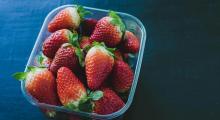
What to do with plastic tubs and trays?
Pots, tubs, trays, punnets...it’s hard to know what to do with the never-ending list of our food packaging.
In 2017, around 300,000 tonnes of plastic pots, tubs and trays were sold in the UK, so it’s important that these are recycled.
Household waste recycling centre
Plastic packaging like pots, tubs and trays are accepted as part of household recycling schemes. It does vary across the country though, so check the recycling tool locator to find out what you can put in your household recycling.
If your council does accept these items, it will usually include:
- Yoghurt pots
- Food pots or tubs for soup, noodles and cakes
- Trays or punnets that hold fruit or vegetables
- Tubs containing cleaning products like stain remover and detergent
- Meat trays
- Margarine tubs
- Ready-meal containers
- Hair gel containers
- Pots containing facial or body creams
What shouldn’t I put in?
- Laminated pouches (pet food or coffee pouches that spring back when you try and scrunch them - these are currently not recyclable)
- Medicine packs (paracetamol packaging)
- Film lids from the pots or trays
- Paint pots - recycle these at your local recycling centre
- Bubblewrap
- Expanded polystyrene (packaging inserts)
- Many local authorities don’t accept black plastic (the kind you find on some ready meals or meat containers) because of difficulties in sorting this colour
- Flower and plant pots can’t be recycled at home but you can sometimes recycle them at household waste recycle centres. The best option for these types of tubs is to find a keen gardener who might be able to reuse them!
Always give items a quick rinse using your left-over washing up water and squash or flatten if you can to save space in your recycling bin. Labels and lids can all be left on but you should remove any non-recyclable plastic film or clingfilm and put it in the general rubbish bin.

Household waste recycling centre (HWRC)
Other types of plastic pots and tubs, like flower pots, can’t be recycled at home but you might be able to recycle them at household waste recycling centres. Check your local council’s website for details.

Other recycling collections
Some nurseries and schools collect plastic tubs and trays for craft or storing odds and ends including paper clips and pencils.

What about raw meat packaging? Can I recycle it?
On the whole, thin plastics are much harder to recycle than thick plastic. If you buy a product like bacon, the thin packaging is non-recyclable and it can cause microplastics.
Thicker plastics are widely recycled. If the package instructs you to ‘check locally’, then visit the recycling locator to find out if this can be included in your household recycling.
You should throw soft plastics in the general waste and put recyclable parts, like card sleeves, in your recycling bin.
What can you do?
We should all try to reduce the amount of single-use packaging we buy and use in the first place.
Take your own tubs to do food shopping to put loose fruit or meat in.
Try to buy food in packaging that is widely recycled.
You can use fruit tubs to cover seedlings (like a mini-greenhouse).
Any cardboard or paper sleeves can be recycled separately from plastic.
Recycling is constantly evolving and changing so check back for updates or try our recycling locator to find out what you can recycle at home and where you can recycle or pass on unwanted items in your local area.
